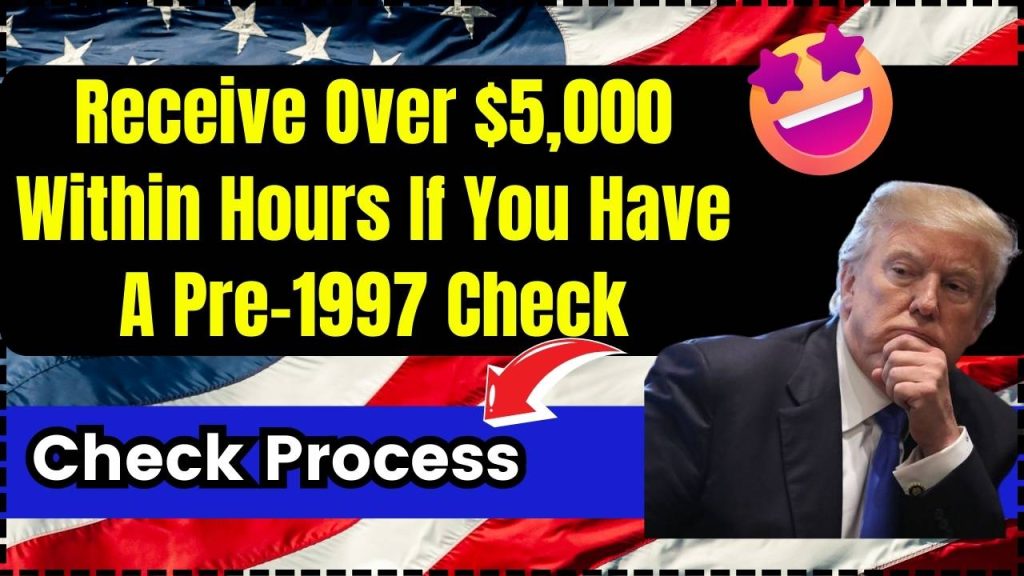Receive Over $5,000 Within Hours If You Have A Pre-1997 Check: Could a forgotten check from before 1997 put thousands of dollars in your pocket? For many people, the answer is yes! Unclaimed property, including old checks, has become a hidden financial treasure, often overlooked for years. This comprehensive guide explores how you can claim these assets, what makes pre-1997 checks special, and actionable steps to ensure you don’t miss out on this opportunity.
Receive Over $5,000 Within Hours If You Have A Pre-1997 Check
Discovering forgotten funds, especially checks from before 1997, can feel like hitting the jackpot. By following the outlined steps, verifying your identity, and avoiding scams, you can claim what’s rightfully yours—often within hours. Make it a habit to check for unclaimed property regularly and keep your financial records organized to prevent future oversights.

| Aspect | Details |
|---|---|
| Unclaimed Property | Assets like uncashed checks, dormant accounts, and life insurance payouts left unclaimed by rightful owners. |
| Potential Value | Pre-1997 checks may exceed $5,000 due to accumulated interest or large original payouts. |
| Claim Process | – Search state databases for unclaimed property.- Verify your identity.- Submit a claim with required documentation. |
| Processing Time | Some claims are resolved within hours, while others may take weeks depending on complexity. |
| Important Resources | – National Association of Unclaimed Property Administrators (NAUPA)– MissingMoney.com- USA.gov Unclaimed Money |
What Is Unclaimed Property?
Unclaimed property includes assets that remain dormant or abandoned after attempts to locate the owner. These assets are typically handed over to the state after a set period. Common examples include:
- Uncashed Checks: Payroll, dividends, or refunds that were never deposited.
- Bank Accounts: Accounts with no activity for several years.
- Insurance Benefits: Life insurance payouts or annuities not claimed by beneficiaries.
- Safe Deposit Boxes: Contents of boxes left unpaid or abandoned.
According to the National Association of Unclaimed Property Administrators (NAUPA), billions of dollars in unclaimed assets are waiting to be claimed, and a significant portion belongs to ordinary citizens who simply forgot about them.
Why Pre-1997 Checks Are Special
Checks issued before 1997 are particularly noteworthy for several reasons:
- Accumulated Interest:
- Some checks, such as dividend payments, have accumulated interest over decades, significantly increasing their value.
- Legal Changes:
- Laws governing unclaimed property have evolved over the years, potentially affecting older checks differently than more recent ones.
- Forgotten Large Payments:
- Many pre-1997 payments were larger amounts tied to insurance settlements, investment payouts, or pensions, making them more lucrative.
Steps to Claim Over $5,000 Within Hours If You Have A Pre-1997 Check
Step 1: Search for Unclaimed Property
Start by visiting official state or national databases:
- MissingMoney.com: A centralized database covering most U.S. states.
- Unclaimed.org: Maintained by NAUPA, this site links directly to state-specific resources.
Input your name, previous addresses, and other identifying details to find unclaimed property associated with you.
Step 2: Verify Your Identity
Once you locate potential assets, prepare to verify your ownership:
- Required Documents: Gather a government-issued ID, Social Security card, and documents linking you to the asset, such as an old utility bill or paycheck stub.
- Verification Process: States may ask for notarized forms or additional information for larger claims.
Step 3: Submit Your Claim
Follow your state’s specific instructions:
- Online Claims: Many states allow you to submit claims online for convenience.
- Mail or In-Person Claims: For high-value claims, you may need to send documents via mail or visit the office.
Step 4: Track Your Claim
Most states provide online tracking tools so you can monitor the progress of your claim. While some are resolved within hours, more complex cases may take weeks.
Examples of Unclaimed Property Success Stories
- A Long-Lost Insurance Payout: A family in New York discovered a $50,000 life insurance payout issued to their grandfather in 1996. They located the funds through the state’s unclaimed property office.
- Uncashed Dividend Checks: An investor in California recovered over $15,000 in forgotten dividend payments from a 1980s stock investment.
These stories highlight the importance of checking for unclaimed property regularly.
How to Protect Yourself from Scams?
The rise in awareness about unclaimed property has also led to an increase in scams. Here’s how to stay safe:
- Avoid Upfront Fees: Legitimate services will not charge you to search for or claim unclaimed property.
- Use Official Resources: Stick to trusted sites like Unclaimed.org and MissingMoney.com.
- Verify Third-Party Offers: If a service offers to locate your property for a fee, verify their legitimacy through state officials.
Factors That Impact Claim Processing Times
While many claims are processed quickly, certain factors can delay the timeline:
- Complex Ownership: Claims involving estates or multiple beneficiaries may take longer.
- Incomplete Documentation: Missing or incorrect paperwork is a common cause of delays.
- State Volume: High claim volumes can extend processing times.
Pro Tips for Success
- Check Regularly: New property is added to state databases frequently, so it’s a good idea to search annually.
- Keep Records Updated: Update your contact details with banks, insurers, and employers to prevent assets from becoming unclaimed.
- Engage a Financial Planner: If you discover significant funds, consider consulting a financial expert to make the most of your windfall.
IRS Adjusts Tax Brackets for 2025: What Every American Needs to Know
Bank of America Lists Spacious Home for Sale at $199,900 – Don’t Miss Out!
Frequently Asked Questions (FAQs)
1. How do I know if I have unclaimed property?
Use official databases like MissingMoney.com or your state’s unclaimed property site to search.
2. Are there deadlines to claim unclaimed property?
No, most states allow claims indefinitely, but acting promptly can help resolve issues faster.
3. Can I claim assets for a deceased relative?
Yes, heirs can claim unclaimed property, often requiring proof of death and legal documents establishing ownership.
4. How much does it cost to claim unclaimed property?
State services are free, but private companies may charge fees for assistance.
5. Can businesses have unclaimed property?
Yes, businesses can have unclaimed assets, including uncashed checks, overpayments, or tax refunds.






